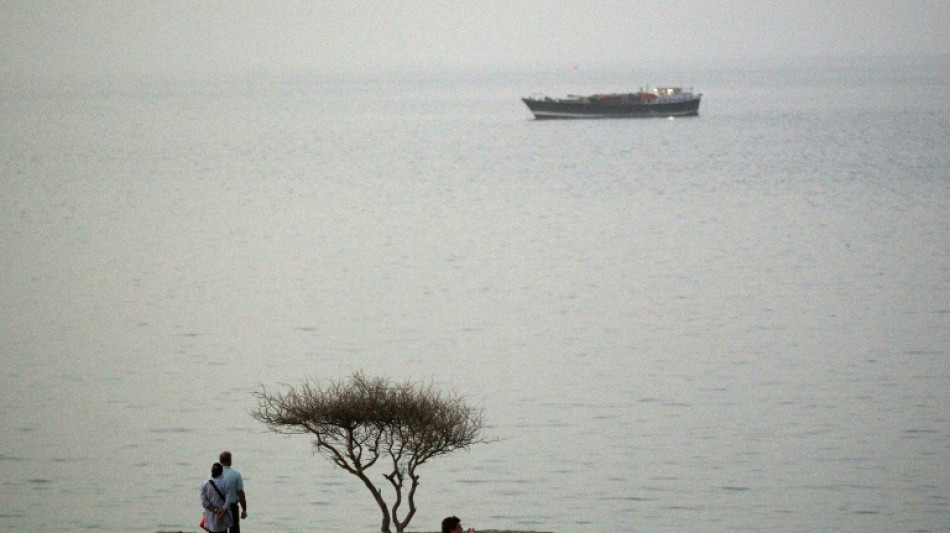
-
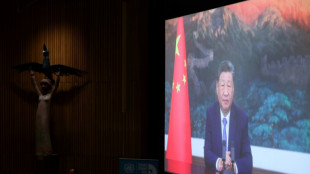 In first, China unveils specific emissions targets
In first, China unveils specific emissions targets
-
Alvarez hat-trick helps Atletico edge Rayo thriller

-
 Con job? Climate change is my job, says island nation leader
Con job? Climate change is my job, says island nation leader
-
US stocks fall again while Alibaba gains on big AI push

-
 Forest denied winning European return by Antony, Roma down Nice
Forest denied winning European return by Antony, Roma down Nice
-
Postecoglou's Forest held by Antony's Betis on European return

-
 Eze nets first goal as Arsenal join Man City in League Cup last 16
Eze nets first goal as Arsenal join Man City in League Cup last 16
-
Guardians' Fry has facial fractures after taking fastball to face

-
 Giants to go with rookie QB Dart, bench NFL veteran Wilson
Giants to go with rookie QB Dart, bench NFL veteran Wilson
-
Police clashes mar rally for Uganda opposition leader Bobi Wine

-
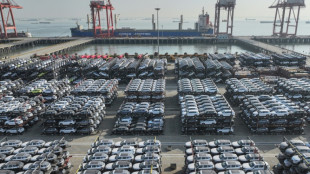 China unveils steady but restrained climate goals
China unveils steady but restrained climate goals
-
Trump 'incredibly impatient' with Russia on Ukraine, VP Vance says
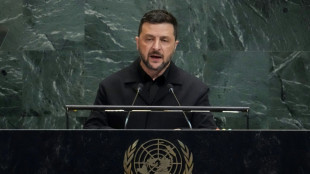
-
 France, US tell Iran still chance to avoid nuclear sanctions
France, US tell Iran still chance to avoid nuclear sanctions
-
Big news: Annual eating contest roars to life in Fat Bear Week

-
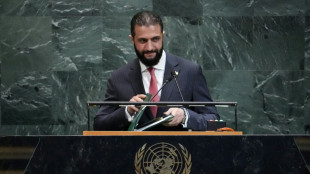 In UN debut, new Syria leader warns on Israel but backs dialogue
In UN debut, new Syria leader warns on Israel but backs dialogue
-
Malawi's ex-president Mutharika returns to power in crushing vote win

-
 Under-fire Brazil senators scrap immunity bid
Under-fire Brazil senators scrap immunity bid
-
Morikawa calls on US Ryder Cup fans 'to go crazy'

-
 India see off Bangladesh to book Asia Cup final spot
India see off Bangladesh to book Asia Cup final spot
-
Rubio calls for Russia to stop the 'killing' in Ukraine
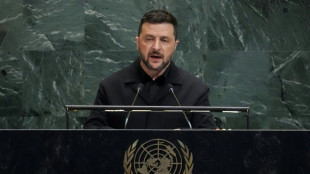
-
 Macron tells Iran president only hours remain to avert nuclear sanctions
Macron tells Iran president only hours remain to avert nuclear sanctions
-
UN humanitarian chief slams impunity in face of Gaza 'horror'
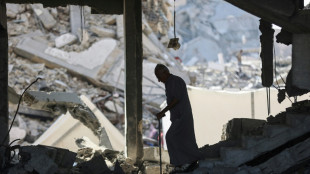
-
 Danish PM apologises to victims of Greenland forced contraception
Danish PM apologises to victims of Greenland forced contraception
-
Planetary health check warns risk of 'destabilising' Earth systems

-
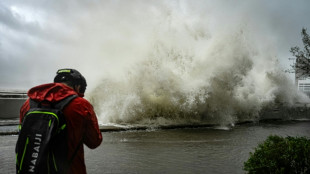 Typhoon Ragasa slams into south China after killing 14 in Taiwan
Typhoon Ragasa slams into south China after killing 14 in Taiwan
-
Monchi exit 'changes nothing' for Emery at Aston Villa

-
 Taiwan lake flood victims spend second night in shelters
Taiwan lake flood victims spend second night in shelters
-
Europe ready for McIlroy taunts from rowdy US Ryder Cup fans

-
 US comedian Kimmel calls Trump threats 'anti-American'
US comedian Kimmel calls Trump threats 'anti-American'
-
Australia win tense cycling mixed relay world title

-
 Stokes will be battle-ready for Ashes, says England chief
Stokes will be battle-ready for Ashes, says England chief
-
Iran will never seek nuclear weapons, president tells UN

-
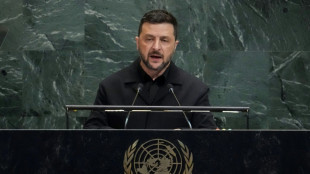 Zelensky says NATO membership not automatic protection, praises Trump after shift
Zelensky says NATO membership not automatic protection, praises Trump after shift
-
Becker regrets winning Wimbledon as a teenager

-
 'Mind-readers' Canada use headphones in Women's Rugby World Cup final prep
'Mind-readers' Canada use headphones in Women's Rugby World Cup final prep
-
Rose would welcome Trump on stage if Europe keeps Ryder Cup

-
 AI optimism cheers up markets following Fed rate warning
AI optimism cheers up markets following Fed rate warning
-
France doubles down on threat to build future fighter jet alone

-
 Delay warning issued to fans ahead of Trump's Ryder Cup visit
Delay warning issued to fans ahead of Trump's Ryder Cup visit
-
EU chief backs calls to keep children off social media

-
 US Treasury says in talks to support Argentina's central bank
US Treasury says in talks to support Argentina's central bank
-
'Everything broken': Chinese residents in typhoon path assess damage

-
 Inside Barcelona's Camp Nou chaos: What is happening and why?
Inside Barcelona's Camp Nou chaos: What is happening and why?
-
UK police arrest man after European airports cyberattack
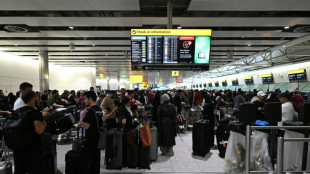
-
 Ballon d'Or disappointment will inspire Yamal: Barca coach Flick
Ballon d'Or disappointment will inspire Yamal: Barca coach Flick
-
French-German duo wins mega offshore wind energy project
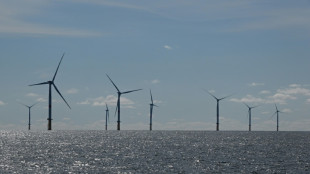
-
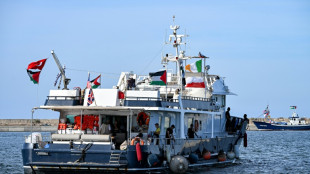 Italy deploys frigate after drone 'attack' on Gaza aid flotilla
Italy deploys frigate after drone 'attack' on Gaza aid flotilla
-
Typhoon Ragasa slams into south China after killing 17 in Taiwan
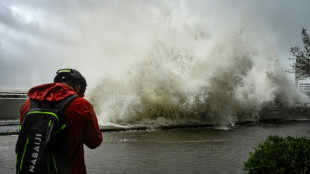
-
 NASA launches mission to study space weather
NASA launches mission to study space weather
-
Stocks torn between Fed rate warning, AI optimism


Asian countries most vulnerable to Strait of Hormuz blockade
Around 84 percent of oil passing through the Strait of Hormuz is destined for Asia, leaving the economies of China, India, South Korea and others vulnerable should Iran blockade the crucial trading route over US strikes on its nuclear sites.
Around 14.2 million barrels of crude oil and 5.9 million barrels of other petroleum products pass through the strait per day -- representing around 20 percent of global production in the first quarter, according to the US Energy Information Administration (EIA).
And crude oil from Saudi Arabia, the UAE, Iraq, Kuwait, Qatar and Iran almost exclusively passes through the corridor.
Here are the main Asian countries where oil exported via the strait is destined:
- China -
More than half of the oil imported by East Asia passes through the Strait of Hormuz, experts estimate.
China is one of the largest buyers, importing 5.4 million barrels of crude oil a day through Hormuz in the first quarter this year, according to the EIA.
Saudi Arabia is China's second-largest supplier of crude oil, accounting for 15 percent of its total oil imports -- 1.6 million barrels a day.
China also buys more than 90 percent of Iran's oil exports, according to the analysis firm Kpler.
It imported 1.3 million barrels of Iranian crude oil a day in April, down from a five-month high in March.
- India -
India is highly dependent on the Strait of Hormuz, importing 2.1 million barrels of crude a day through the corridor in the first quarter, EIA data shows.
Around 53 percent of India's imported oil in early 2025 came from Middle Eastern suppliers, particularly Iraq and Saudi Arabia, local media reported.
Wary of an escalating conflict in the Middle East, New Delhi has increased its imports of Russian oil over the past three years.
"We have been closely monitoring the evolving geopolitical situation in the Middle East since the past two weeks," India's Minister of Petroleum and Natural Gas Hardeep Singh Puri said on Sunday.
"We have diversified our supplies in the past few years and a large volume of our supplies do not come through the Strait of Hormuz now," he wrote on X, adding "We will take all necessary steps to ensure stability of supplies of fuel to our citizens."
- South Korea -
Around 68 percent of South Korea's crude oil imports pass through the Strait of Hormuz -- 1.7 million barrels a day this year, according to the EIA.
South Korea is particularly dependent on its main supplier Saudi Arabia, which last year accounted for a third of its oil imports.
Seoul's trade and energy ministry said there have been "no disruptions so far in South Korea's crude oil and LNG imports" but "given the possibility of a supply crisis", officials were "planning for potential disruptions in the Strait of Hormuz".
"The government and industry stakeholders have prepared for emergencies by maintaining a strategic petroleum reserve equivalent to about 200 days of supply," the ministry said in a statement.
- Japan -
Japan imports 1.6 million barrels of crude oil a day through the Strait of Hormuz, the EIA says.
Japanese customs data showed 95 percent of crude oil imports last year came from the Middle East.
The country's energy freight companies are readying for a potential blockade of the strait.
"We're currently taking measures to shorten as much as possible the time spent by our vessels in the Gulf," shipping giant Mitsui OSK told AFP.
- Others -
Around 2 million barrels of crude oil passing through the Strait of Hormuz each day in the first quarter were destined for other parts of Asia -- particularly Thailand and the Philippines -- as well as Europe (0.5 million barrels) and the United States (0.4 million barrels).
- Limited alternatives -
Asian countries could diversify their oil suppliers, but it is difficult to replace the large volumes coming from the Middle East.
In the short term, "elevated global oil inventories, OPEC+'s available spare capacity, and US shale production all could provide some buffer", experts at MUFG Bank said.
"However, a full closure of the Hormuz Strait would still impact on the accessibility of a major part of this spare production capacity concentrated in the Persian Gulf," they said.
Saudi Arabia and the UAE have infrastructure to bypass the strait, potentially mitigating disruptions, but their transit capacity remains very limited -- around 2.6 million barrels a day.
And the Goreh-Jask pipeline built by Iran to export via the Gulf of Oman, which has been inactive since last year, has a maximum capacity of only 300,000 barrels per day, according to the EIA.
burs-jug/dhw/mtp
F.Wagner--VB
